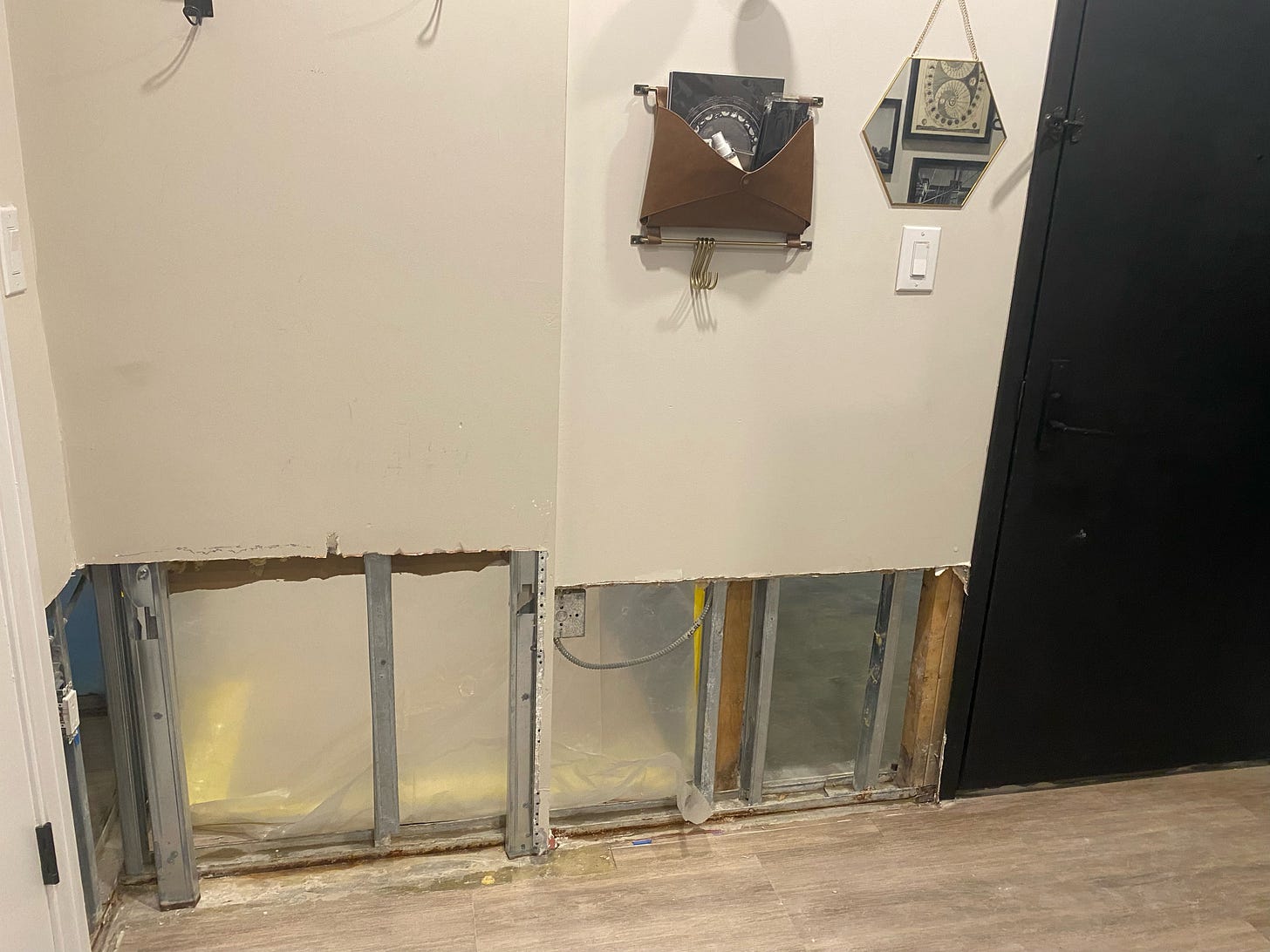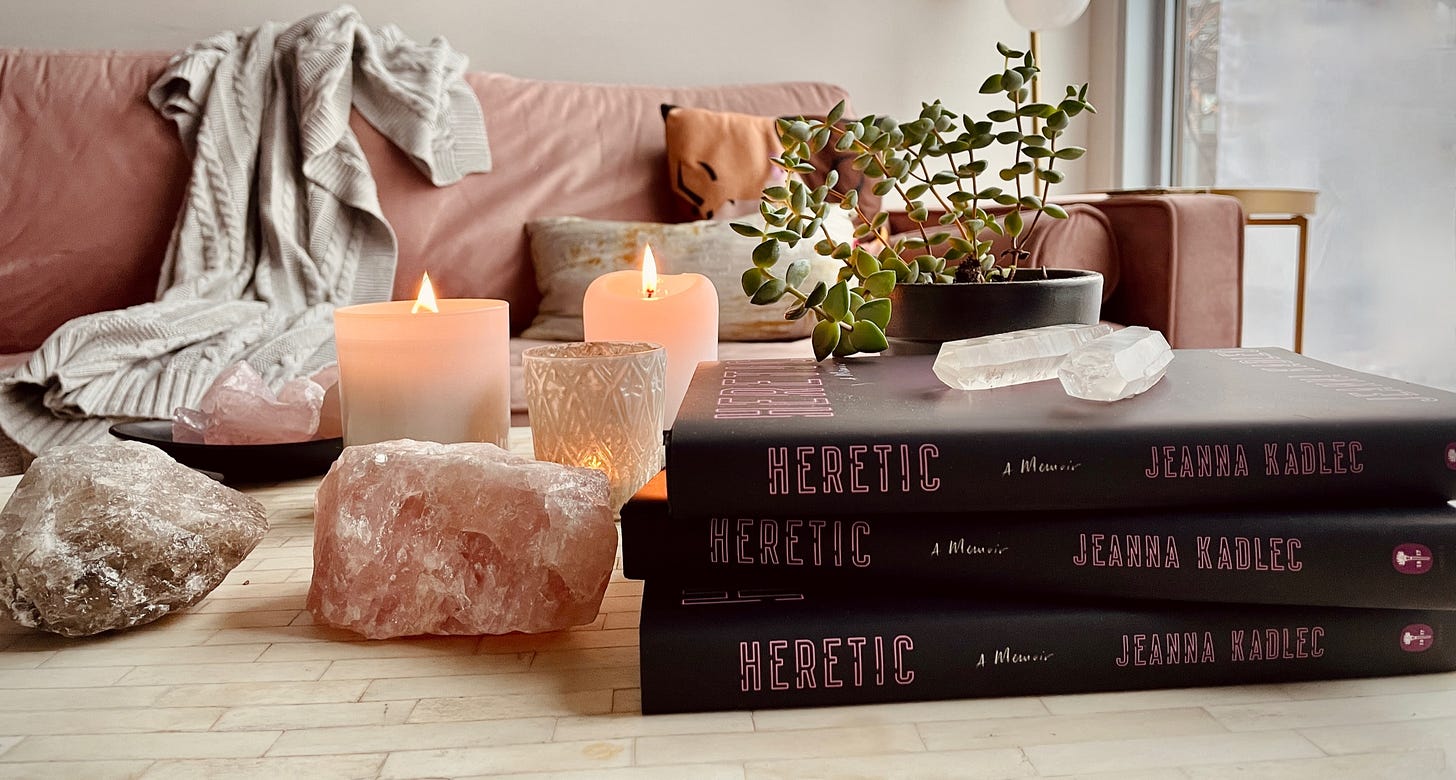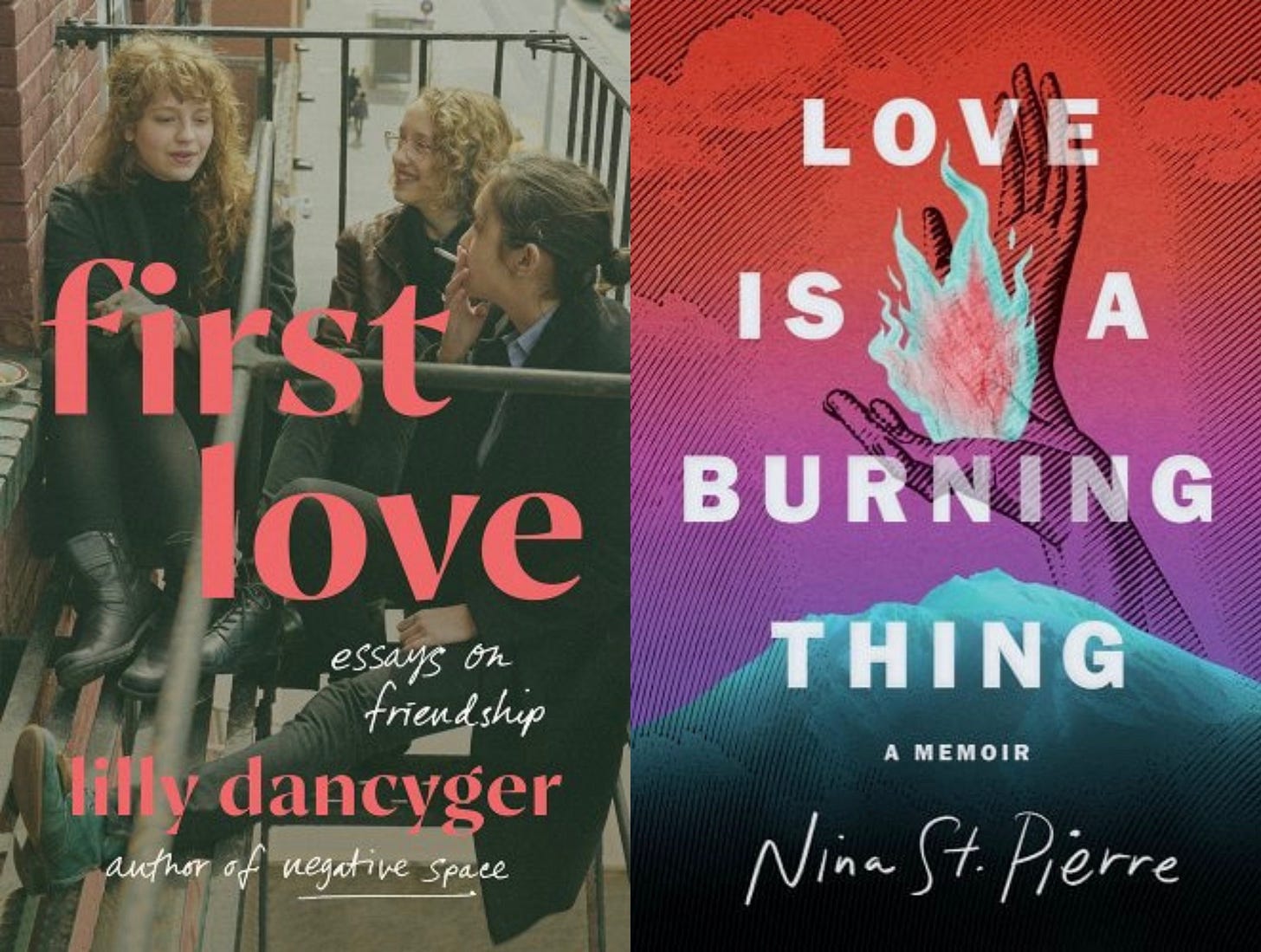6 Things I’ve Learned in the Year Since My First Book Came Out
on book sales, tours, and more
Today is my first book’s first birthday.
And so first of all, I just want to say:
To everyone who has read Heretic, bought it or rented it from your local library, reviewed it on Goodreads or Storygraph or even Amazon (all of which make such a tremendous difference!), showed up and showed out for events at bookstores and online, emailed or DMd me about your experiences with the church and coming out:
Thank you. You have made my year. And you were the whole goddamn point of this.
And now.
I’m gonna get very, very real about publishing in this newsletter, because this newsletter is about astrology and spirituality, yes, but/and/also about the reality of living under the oppressive conditions of (white supremacist, heteropatriarchal) capitalism as working creative people. Those of you who have been reading for years here know that we are very practical around these parts!
I’ve had a lot of very strange and highly specific publishing experiences.
I’ve gone on submission and not sold a book, then revised it, gone back out with it, and sold it at auction.
The indie publisher I was initially with (Houghton Mifflin Harcourt/HMH) got acquired and eaten by a Big 5 (HarperCollins).
And that initial period of Heretic’s launch, those precious weeks of trying to get the book into the world and into readers’ hands, was when Harper employees went on strike, which ultimately resulted in an almost complete press- and review-ban on Harper books as well as a reader boycott.
Barring the selling-a-book-at-auction, those are experiences I quite frankly hope to never have again. However, they were very informative. They also meant that I learned to ask questions early: of my agent, of other writers, of my team at HMH and then Harper — namely, “is this normal?” or “is this how everyone does things or just how y’all do things?”
Here are some things I’ve learned in the year since my first book came out — some more publishing-oriented, some more personal.
Take what you like, leave the rest.
What constitutes “good sales”? Who knows?! (Or: every house will have different expectations for what makes your book a success.)
As in all parts of publishing, “good sales” is going to be specific to house and imprint, and also to genre, author status (e.g. debut or non-debut; celebrity or unknown), whether the book is a lead title (although the marketing machine often works to engineer good sales for lead titles), and so many, many other factors. But shooting for that arbitrary grade of “good sales,” e.g. sales that won’t mean I have to sell my next book under pseudonym, is deceptively difficult. Because publishers themselves, as evidenced by the PRH trial, are always moving the goalpost.
For me, this really showed its face when it came to the question of whether Heretic would be getting a paperback.
Of course my book would have a paperback. Of course it would! I eagerly awaited it, since it would be a second shot in a market where the strike and boycott had not given the book its best chance. Everyone I knew got a paperback. I have seen books that had very low sales numbers get paperbacks.
So I made what in hindsight was the extraordinary mistake of assuming that, provided I cleared a reasonable hurdle, I would also get one.
What I failed to realize, in assuming that, was that Harper is the one Big Five that does not auto-route its hardcovers to paperbacks, because it in fact has its own imprint devoted to paperbacks, Harper Perennial, that both acquires books independently and also decides to pick and choose which hardcovers from other imprints it will pick up. The nice thing about this (I was told) is that if a book unexpectedly takes off years later, Harper Perennial can then pick it up and do a paperback run and marketing campaign. Okay. But for most authors, that means that unless we meet the imprint’s internal criteria, we are never in the running for a paperback.
When we finally got the Q4 statement for 2022 (and my book came out in Q4!), I was happy with my sales and, most importantly, my agent was happy with my sales. They were, frankly, much higher than I’d expected, given the strike and boycott. I wasn’t going to be on anyone’s bestseller list anytime soon, sure, but the numbers were decent! Respectable. But not to Harper Perennial’s standards. C’est la vie!
I spent a few weeks letting my anger about that galvanize me into sending books to BookTokers this summer. Strongly recommend, was a very productive way to vent.
The BookScan* data authors purportedly have access to on Amazon cannot be trusted.
Let me put it this way: the total BookScan sales that Amazon is currently showing for me, purportedly for the last year, is, in actuality, a mere 1/7th of the sales that were on my royalty report for Q4 of last year.
When I first heard that I wasn’t getting a paperback, and I was assuming my numbers were close to what Amazon was showing as my BookScan numbers, I was like… okay, yeah, sure, I get that. Even assuming, as I’d heard from so many folks, that BookScan maybe only shows a quarter of the total sales, since it doesn’t account for e-books and such and not every bookstore reports into BookScan — I was like, oh, well, even if my Amazon Author Central is only showing a quarter of my total sales, I can still see how I’m not getting a paperback. We’re not even clearing five thousand copies with that number. I get it.
BUT THEY WERE ONLY! SHOWING! LITERALLY! ONE! SEVENTH! OF MY Q4 2022 SALES!!!!!!!!!!!!!!!!!!!!!!!!!!!!
Unless you are self-published and exclusively publishing on Amazon, in which case I assume you have much better insight into your own sales data than the rest of us do — do not trust their purported access to BookScan. For most of us, royalty statements are the only source that can actually be relied upon. (And apparently, some authors, like at PRH, have access to a portal with more up to date real time sales figures? So jealous.)
Just because you have it in your contract that your publisher has to pay for a book tour does not mean they will give you a book tour. (But put it in your contract that they have to pay for a tour, anyway!)
Tours fell off during peak COVID years for obvious reasons, and never really recovered. They’re incredibly expensive to fund for the average author, especially debuts. While a handful of imprints, like Astra, are still known for rolling out big tours for debuts, most don’t. Typically, the focus will be on one launch event in the city where the author lives, and then a handful of events the author may work to make happen that the publicist may help with.
My publisher was committed to planning a launch event for me (although I have seen smaller publishers literally not plan launch events for authors — so for the love of everything, MAKE SURE you get this!). And I had a wonderful publicist who I worked closely with who was a real partner for when I pushed for a few more events (your publicist is your ally! Who is also inundated and overworked and working on a million books! Some compassion for their job, and appreciating that they aren’t miracle workers, goes a long way). It wasn’t a tour, but Harper did pay for my travel and hotel for a Boston book event. Which was great. And wouldn’t have happened if it wasn’t in the contract!
But when I had to push an event at the iconic bookstore Prairie Lights in Iowa City, Iowa a few months back due to my partner and I getting COVID, the publisher would no longer pay for my travel and accommodations because it was officially too far out from the book’s release date to feasibly be considered a tour — you see how finicky these things can be.
These days, when I see a debut author (fiction or non) getting an even semi-national book tour, I immediately check what publisher/imprint they are with. Tours are just more of a standard protocol with some imprints than others. The vast majority of my author friends planned and paid for their own tours, and a lot of us had that half-and-half situation where it was partly publisher funded and partly paid for personally. And while author-funded tours are absolutely tax deductible, they are still expensive as hell.
The 6-week post-pub crash is REAL. Do your best to give yourself a cushion around that time.
I’d seen authors talk about the emotional crash ca. six weeks after the book comes out, when the press and publicity has died down, any tour or events are over, and no one really cares about your book anymore, and yes, that is a very, very real phenomenon.
It so happened that mine coincided with a pipe bursting and flooding our apartment at two in the morning and then dealing with contractors in our apartment weeks on end literally taking the walls out of our apartment (because of black mold), so that we were sharing walls with our neighbors. Then, we got COVID from the contractors. So.

It was a weird crash, compounded by a lot of other things, but it was definitely a crash. The events surrounding mine meant that it’s difficult to separate all the book feelings from the ravagings of life (lolsob), but I wish that there had been more softness and grace in that period.
It was also a time when I was just beginning to think about what would turn into a very emotionally difficult memoir project that I have since Shelved, and that was just not the kindest thing to be doing to myself. Maybe don’t be pushing yourself to write a new emotionally draining project around that time? Or be pushing for “productivity” period? idk idk just an idea!
After having just worked on one book for years and years, it is very strange to go back to Square One.
In the lead-up to Heretic coming out, I saw Alexander Chee tweet something that I now desperately wish I had screenshotted along the lines of, you only get your relationship with your writing before publication once. Which is to say, your relationship to your writing changes after the audience is involved, so cherish it before.
I understand what he meant, now. I feel like I’ve spent this entire first year post-Heretic burrowing, desperately trying to find a cavern deep enough to hide back away from the world in. Somewhere I can tend the little spark that is this new book in utter privacy.
Now that I have found it, it is strange, how quickly a new story has formed. Given the proper conditions, and released from the pressure of of public performance, she is flourishing. I am remembering (re-membering) how messy a first-first draft is, the shape that emerges, the mere act of getting words on a page long before they have been made beautiful. For this is the kind of writer I am, which you probably already know: far more interested in the story than in the lyricism. But the story is unfolding, day by day, revealing itself to me as I am out for neighborhood walks, listening to music, sitting at my desk. It feels like I can barely build track fast enough for the train that’s coming.
But I need solitude for that. I feel protective of this story, still, wanting to ensure it has the space in my body, in my mind, in my heart, to just exist and move and change and be as fluid as it needs to be. It feels as if it’s taken a year after the sponge-wringinng-out that is writing a memoir, and sharing a memoir, which is to say, putting your life out there for others to just read about, for me to quiet my nervous system down enough to get truly intimate with another story.
This time around, I am, actually, sharing quite a bit of this book with my partner, more than I’ve ever told anyone else about a novel I’m working on. My writers’ group knows about some of it, as well. There is that trusted coven, as it were, who sits at the caverns’ entrance as I am inside, dancing around the fire with the shadows of this tale. They help me hold space for this spark: my creative intimates and fellow Watchers, who I trust to help me tend the boundary against the hordes and the egregores and, perhaps most of all, the self-doubt and inner critics — monsters of my own making.
Which is all to say.
Your relationships with other writers will save you.
Writing can be a solitary process, but publishing a book is a group project. It is absolutely vital that you surround yourself with people who are on your side, who get your book, who get you, and who can advise you, ego-check you, and also tether you when it’s absolutely necessary to rage and wail when this horrible industry does its worst.

And who will, then, hold you and comfort you through the six-week crash, through the months when you don’t want to write or even read a thing, when you are wading through the dreck of new projects and ideas, when you are molting like a burned out phoenix in a bed of dust and ash. No, you aren’t crazy. No, you aren’t a failure. Yes, you should rest. And yes, when you’re ready, you should write only what most fills your heart.
I do not know what I would have done this year without my writers’ group: Angela Chen, Deena ElGenaidi, Lilly Dancyger, and Nina St. Pierre. Our group chat, our meetings, our informal dinners. Those four women have almost single-handedly held my professional sanity together, and with it, much of my personal sanity, as well.
Incidentally, both Lilly and Nina have incredible new books coming out in spring 2024, which you should pre-order: Lilly’s new essay collection First Love: Essays on Female Friendship, which is devastating but also edifying, and Nina’s debut memoir about her relationship with her mother, a woman who set two major fires decades apart, and their dual pursuits of transcendence, Love is a Burning Thing. Both will wreck you and re-form you.
And that’s the other nice thing: when you’re friends with other writers, you can focus on their books and their projects!!! Helps with perspective and pulling your head out of your own ass.
What about you, friends? There are lots of authors here on this list (and in the Discord!) — what did you learn after your first book came out? What have you learned about publishing and/or the creative process, having had multiple books come out? The comment section is open!
*for those who don’t know, NPD BookScan is the wildly unreliable system that “everyone” in publishing uses to account for book sales, since publishing houses (who are actually the most reliable) obviously aren’t sharing their internal numbers with competitors. but a few issues: BookScan only tracks physical print books, so it doesn’t count e-book sales OR non-retail reporting channels like libraries (which is huge). and not all bookstores report to BookScan, anyway! it’s a very inconsistent system. so total BookScan sales are estimated to account for anywhere from 25% to 75% of a book’s total sales. you see the issue.




One thing that struck me about my publishing experience was just how unpredictable the people in my life were about my book. There were some folks who I knew would be cool and supportive, and they absolutely were. (Yes, mostly other writers. They get it!) But some folks popped out of the woodwork -- a friend from elementary school came to one of my events and said she'd handsold my book to her entire extended family! And a person I considered a close acquaintance but maybe not yet a friend did one of the closest readings of the book of anyone I knew and talked to me for a long time about it. And then on the other hand: I took a copy of my book in person to my favorite English teacher from high school. He... didn't remember me. I think he barely said congrats. I held out hope he might one day follow up via email, but, nah.
It was a mostly good experience, and I was hoping I'd be able to follow it up with something else more quickly than I have. (I was with Harper too. No paperback, rejected my option book, my editor left, all that fun chaos. I more or less feel like a newbie writer again.) Anyway, really enjoyed the newsletter, even though it brought up a lot of Feelings. That post-pub crash is REAL, and I can't speak for anyone else, but sometimes I still get waves of malaise when the topic of publishing comes up.
I was so naïve. As an academic who published dozens of articles about my Great Discovery, and was tired of giving interviews about it, I believed that if I published a book about it, they would finally leave me the hell alone and I could concentrate on my Next Great Discovery. A dozen years later, they still ask for interviews and ask the same damn questions - questions that I answered in the book. But reporters gotta report,and that means asking questions and having the source (me) answering them.
I do not believe there is a solution. Either write the book and be gracious about all the interviews or don’t write the book.
Gawd.